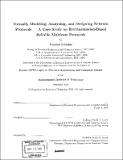| dc.contributor.advisor | Nancy A. Lynch. | en_US |
| dc.contributor.author | Livadas, Carolos | en_US |
| dc.contributor.other | Massachusetts Institute of Technology. Department of Electrical Engineering and Computer Science. | en_US |
| dc.date.accessioned | 2014-05-23T19:32:27Z | |
| dc.date.available | 2014-05-23T19:32:27Z | |
| dc.date.copyright | 2003 | en_US |
| dc.date.issued | 2003 | en_US |
| dc.identifier.uri | http://hdl.handle.net/1721.1/87451 | |
| dc.description | Thesis (Ph. D.)--Massachusetts Institute of Technology, Dept. of Electrical Engineering and Computer Science, 2003. | en_US |
| dc.description | Includes bibliographical references (p. 247-250). | en_US |
| dc.description.abstract | In this thesis, we conduct an extensive case study on formally modeling, analyzing, and designing retransmission-based reliable multicast protocols. We first present an abstract model of the communication service that several reliable multicast protocols [12, 13, 32-34] strive to provide. This model precisely specifies i) what it means to be a member of the reliable multicast group, ii) which packets are guaranteed delivery to which members of the group, and iii) how long it takes for a packet to be reliably multicast to the appropriate members of the reliable multicast group. We then model and analyze the correctness and performance of three retransmission-based reliable multicast protocols, namely the Scalable Reliable Multicast (SRM) protocol [12, 13], the novel Caching-Enhanced Scalable Reliable Multicast (CESRM) protocol [24], and the Light-weight Multicast Services (LMS) router-assisted protocol [32-34]. We show the each such protocol is correct by proving that it is a faithful implementation of our reliable multicast service model. These correctness proofs ensure the equivalence of the protocols in the sense that they guarantee the delivery of the same packets to the same members of the reliable multicast group. Under some timeliness assumptions and presuming a fixed number of per-recovery packet drops, we show that our model of SRM guarantees the timely delivery of packets. Our timeliness analysis of SRM reveals that the careless selection of SRM's scheduling parameters may introduce superfluous recovery traffic and may undermine the loss recovery process. This is an important observation that has, to date, been overlooked. | en_US |
| dc.description.abstract | CESRM augments SRM with a caching-based expedited recovery scheme that exploits packet loss locality in IP multicast transmissions by attempting to recover from losses in the manner in which recent losses were recovered. We analytically show that the worst-case recovery latency for successful expedited recoveries in CESRM is roughly 1 round-trip time (RTT) where as that of successful first-round recoveries in SRM is 4 RTT (for typical scheduling parameter settings). Moreover, trace-driven simulations, which exhibit the packet loss locality of actual IP multicast transmissions, reveal that CESRM reduces the average recovery latency of SRM by roughly 50% and incurs less overhead in terms of recovery traffic. Finally, although LMS recovers promptly from packets in static membership and topology environments, we demonstrate several dynamic scenarios in which LMS does not perform well. Thus, CESRM is a preferable reliable multicast protocol to both SRM and LMS; CESRM inherits SRM's robustness to dynamic environments and, thanks to its caching-based expedited recovery scheme, drastically reduces the average recovery latency of SRM in static environments. | en_US |
| dc.description.statementofresponsibility | by Carolos Livadas. | en_US |
| dc.format.extent | 250 p. | en_US |
| dc.language.iso | eng | en_US |
| dc.publisher | Massachusetts Institute of Technology | en_US |
| dc.rights | M.I.T. theses are protected by copyright. They may be viewed from this source for any purpose, but reproduction or distribution in any format is prohibited without written permission. See provided URL for inquiries about permission. | en_US |
| dc.rights.uri | http://dspace.mit.edu/handle/1721.1/7582 | en_US |
| dc.subject | Electrical Engineering and Computer Science. | en_US |
| dc.title | Formally modeling, analyzing, and designing network protocols : a case study on retransmission-based reliable multicast protocols | en_US |
| dc.type | Thesis | en_US |
| dc.description.degree | Ph.D. | en_US |
| dc.contributor.department | Massachusetts Institute of Technology. Department of Electrical Engineering and Computer Science | |
| dc.identifier.oclc | 54927279 | en_US |
